The latest Indian eatery in Hà Nội adds spice to the Xmas Cheer with new dishes and matching wines, writes Hari Chathrattil.
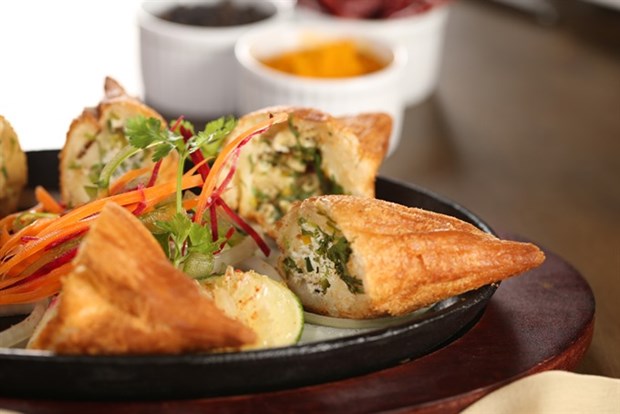
Everyday special: The Dahi de kabab is one of the unusual starters served at Spices. Photos courtesy Spices website.
A
collective head-scratching was in progress as we entered the restaurant.
Thu,
Shiva and a few other staff standing around a cylindrical pillar covered with
thin wooden panels, trying to figure out how that could be converted into a
Christmas tree.
I
could not think of any practically feasible idea, so I decided to focus on what
we were there for. To eat.
And
eat we did. More about that meal soon.
On
my next visit, I was impressed with the simple, inexpensive solution that had
created the Xmas tree at Spices, the new Indian restaurant to open in Hà Nội.
The
mandatory gift boxes were placed around the pillar and red and green coloured
paper had been cut and shaped to make a tree in three or four sections. The
paper sections were bordered with silver White stickers of snowflakes, Santa
and reindeer and other decorations graced the glass walls in front.
After
congratulating Thu and her staff, I wanted to know if there were any Xmas
specials to go around, food and spirit-wise.
Discount
on wines specially selected to go with Indian food, I was told.
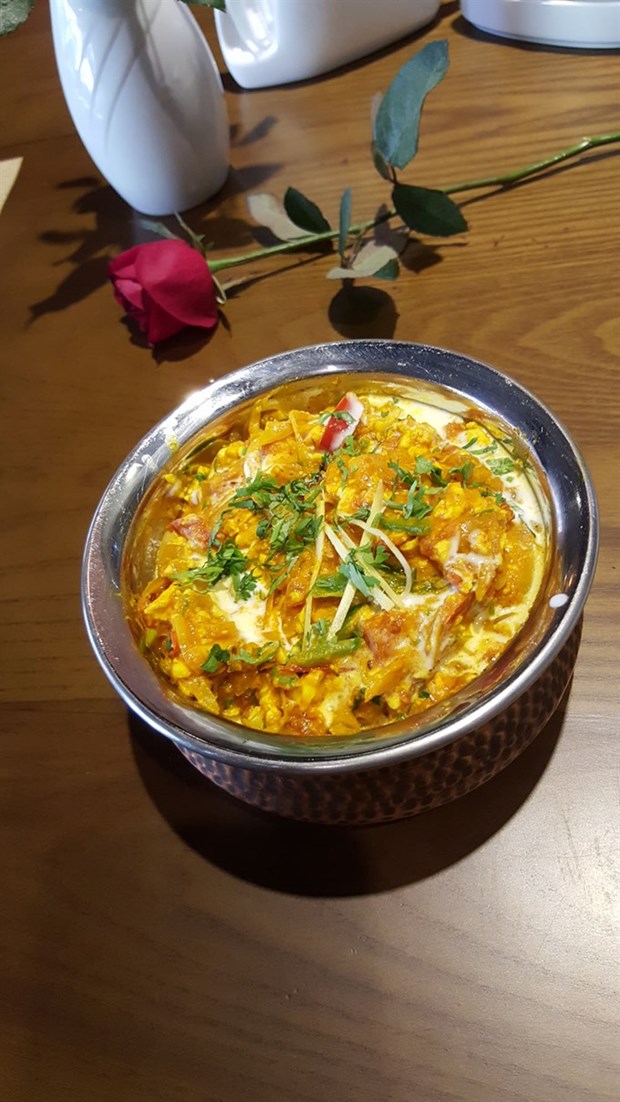
Going rarra: Minced paneer cooked with onions, capsicum and tomatoes is spicy, and can be spicier. Why it’s called rarra is anybody’s guess.
I
wanted to know more and Đỗ Thúy An, whose charming smile is part of the
appetizer to every meal at Spices, obliged.
"Spicier
wines are for spicier food," she said.
"Give
me an example," I said.
"Well,"
she said, "if you have any of the Chettinad dishes, which are both spicy
and a bit sour, the wine should be a strong one, with a sour tinge as
well."
"And
how do we know that a wine would have that sourness? Depends on the
grape," she said.
To
have a Vietnamese woman speak to you about Chettinad dishes and grapes that
make wine spicy and sour was really cool. It also showed that the restaurant is
serious about training its employees to provide good, informed service to their
customers, most of whom are not Indians.
But
I was a bit more curious. I asked An if she’d tried any of the Indian dishes
she talks about, and what her favourite dish was.
"Mutton
tawa masala (VNĐ150,000)," she said. "Hmm. Your favourite bread?
Roti." Hmm again.
Usually,
Vietnamese customers having Indian food go for the mildly spicy chicken makhini
(chicken butter masala) or a panneer makhini (cottage cheese chunks in a tomato
gravy) with garlic and/or butter naans as the bread of choice.
An’s
favourite, and that of a lot of Korean customers who frequent the restaurant,
is a really spicy lamb curry and her choice of bread is the more wholesome, dry
roti.
The
tastes, they are a changin.
Which
brings us back to the meals my friends and I have had here.
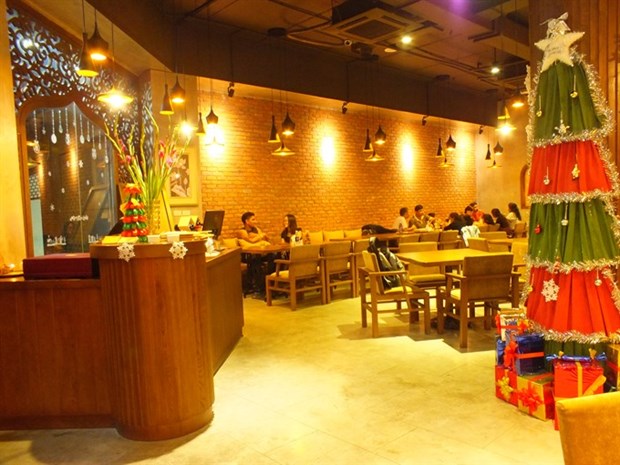
Holiday spirit: A wooden pillar hosts Christmas Tree decorations at the Spices Restaurant, the newest Indian eatery in Ha Noi. Photo Hari Chathrattil
Aware
of the need to be different, Spices has a menu with several dishes that are not
found in other Indian restaurants in the capital city. The “Amras ke Aloo”
(VNĐ85,000) for instance, a potato curry made with green mango pulp. Given the
sourness involved, this probably goes well with The Accomplice, a Shiraz wine
from Australia (VNĐ575,000), described as “plum fruit with some spiciness…
finishing with soft tannins.
“I
have been to many places, but never had this dish before,” said Harihara
Ramachandran, a software professional based in Singapore visiting Việt Nam for
the first time. The gaggle of adults and children he was with nodded assent,
all of them satisfied with all the dishes they’d tried.
One
of them thanked Shivam, the manager, for the “thayir saadam” that the chefs
made after taking instructions from the guests themselves. Basically rice mixed
with yoghurt and seasoned with mustard seeds, red chillies and curry leaves, it
is a very simple south Indian dish that is quite difficult to get right. It’s
not on the Spices menu, but the crew of north Indian chefs, Manish Singh Rawat,
Shyam Singh and Shashi Kumar, are open to suggestions and willing to innovate.
Their
yoghurt-based starter, Dahi ke kabab (VNĐ95,000), is another rarity in Việt Nam
worth trying, as is another appetiser, Paneer Tikka Chatpatta (VNĐ95,000),
cottage cheese chunks marinated with tomato and garlic chutney before being
grilled in the tandoor oven, and served like a sizzler on a bed of caramelised
onions.
“Texture
of tofu and taste of cheese,” said a Vietnamese friend trying the dish for the
first time.
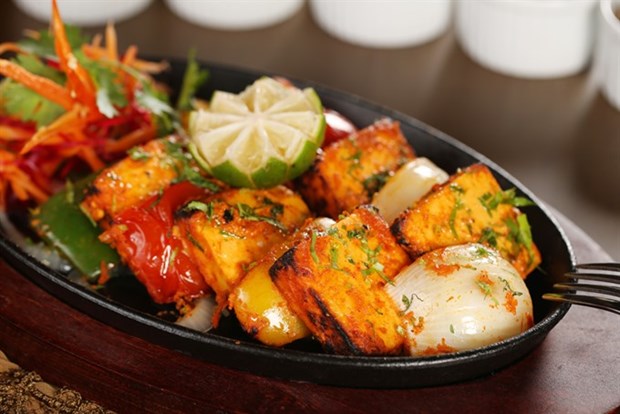
Grilled goodness: The Paneer Tikka Chatpatta comprises cottage cheese cubes marinated with tomato and garlic chutney, grilled in a tandoor.
Baingan
Bartha (VNĐ85,000), Khumb Mutter Masala (VNĐ85,000), Paneer Rarra (VNĐ95,000)
and three different lentil curries (Dal Makhini, Dal Panchrangi and Dal Dhaba
VNĐ85,000) are some of the main vegetarian dishes I have tried and would
recommend, alongside a bread selection comprising naans, parathas and rotis.
The
selection of rice dishes in the “Basmati Khazana” also contains a spicy Mirchi
Pulao (VNĐ70,000) that I have not found elsewhere.
The
Litchi ki Tehri dessert deserves a special mention. This is a lightly sweet
condensed milk dish cooked over a low flame for a long time, chilled and served
with nuts and fruits. Adding the litchi to it is an inspired choice.
Spices,
which opened just three months ago, aims to be different, and going by the menu
and the taste of dishes I have tried so far, it has succeeded.
Aesthetically
the most pleasing Indian restaurant in town with a quietly elegant interior
bathed in soft hues, and old sewing-machines converted into tables, Spices
already has patrons who have become regulars.
Not
surprising. Just the large number of new dishes is worth repeat visits.
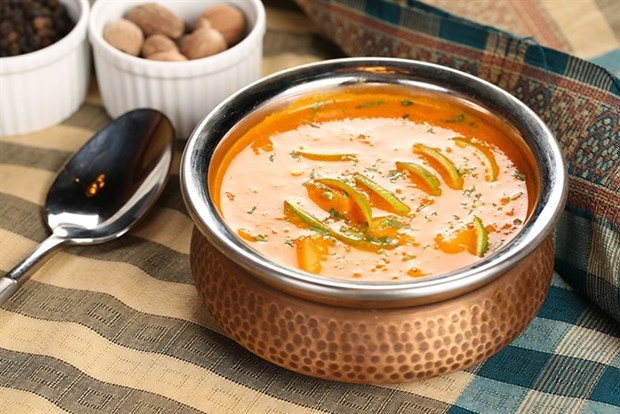
Mango tango: A potato curry cooked with green mango pulp is not served elsewhere in Viet Nam.
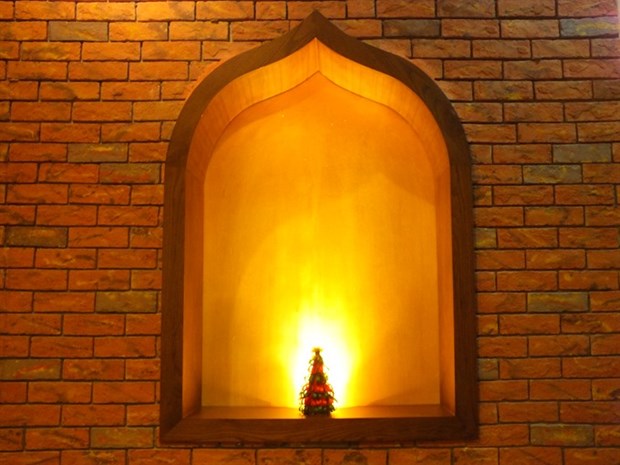
Xmas light: A handmade Christmas tree nestles below an arch at the Spices restaurant in Ha Noi. Photo Hari Chathrattil.
By VNS